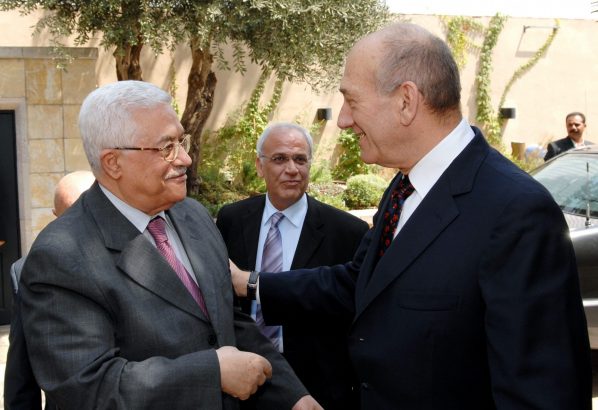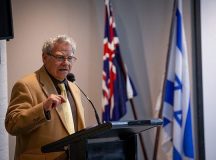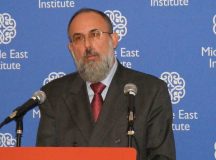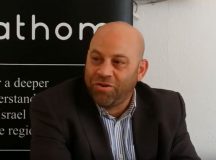Former Israeli prime minister Ehud Olmert was one of Ariel Sharon’s closest political allies; in 2005 the two crossed the political Rubicon hand in hand. The men who had left Likud still believed in Jabotinsky’s Iron Wall, but thought it needed to move west, across the Jordan River, and be erected – literally and figuratively – more or less along the Green Line. Olmert’s effort to strike that deal with the Palestinians in 2008 failed, but not by much. Tal Kra-Oz sat down with Olmert and discussed his political journey, his near-miss peace talks and his thoughts on Israeli politics today.
The Israeli Prime Minister’s Club is a small one. Aside from Benjamin Netanyahu, the country is home to only two living former prime ministers: Ehud Barak and Ehud Olmert. Though all three men are in their seventies, none seem to have any desire to assume the role of elder statesman. On the contrary, they continue to be Israel’s leading practitioners of politics as a contact sport.
For Netanyahu, politics could not be more existential: he has been indicted on charges of bribery, fraud and breach of trust, and his legal defense strategy seems mainly to consist of remaining in power at almost any cost, while loudly questioning the motives of the police, the state attorney’s office, and the courts (Netanyahu failed to secure a working coalition in the two general elections held in 2019, and remains at the helm of a caretaker government ahead of a third round of elections scheduled for March 2, 2020).
Barak and Olmert are a different story. They are both controversial figures. They both defeated Netanyahu when they ran for office, only to hold brief terms as prime minister, certainly when compared with Netanyahu’s accumulative thirteen years. But while Benny Gantz has been the only man to pose a serious challenge to Netanyahu’s reign, Barak and Olmert have emerged as Netanyahu’s most vocal public critics. Barak was first, cultivating a pugnacious Twitter presence before finally entering the fray himself in the second round of elections as co-chair of the Democratic Union, a hail Mary attempt to unite the parties to the left of Gantz’s Blue and White that otherwise risked electoral oblivion. And while the Democratic Union achieved only marginal success and Barak has taken a step back in 2020, Olmert’s public profile is on the rise.
I met with Olmert in his office in downtown Tel Aviv for a wide-ranging conversation about his career and the country’s past, present and future (our meeting took place before Netanyahu formally abandoned his plea for legal immunity, and before the unveiling of Trump’s ‘Deal of the Century’ which sparked plans to quickly annex Israeli settlements in the West Bank). Olmert had recently undergone back surgery due to a herniated disc, but was pleased to report that he had run 15 kilometers and done an hour of strength training on the day before our interview. Olmert is as genial as they come, but does not mince words. He answers questions with fully formed, completely off the cuff lectures that combine his legal training, anecdotes from his decades in office and his reliably truculent instincts.
Olmert’s Political Journey
It is one of Israel’s many ironies that the man who is perhaps the opposition’s most effective and accomplished speaker is saddled with so much baggage of his own. Born in 1945, he was sworn in as a Knesset member on behalf of Likud in 1974. He remained in parliament until 1993, when he successfully beat Jerusalem’s legendary mayor, Teddy Kollek. In 2003, after two mayoral terms, he returned to national politics, and two years later helped orchestrate the ‘big bang’ of Israeli politics, creating the centrist Kadima party with Prime Minister Ariel Sharon. In early 2006, when Sharon fell into a coma, Olmert stepped in as acting prime minister, and led Kadima to an electoral victory some months later.
His remarkable political career notwithstanding, Olmert is also a convicted felon. He spent the years after he left office in 2009 defending himself in a series of corruption cases dealing with events that took place before he became prime minister. He was eventually found guilty of bribery and obstruction of justice, and served sixteen months in prison (he was released in the summer of 2017). No surprise, then, that Olmert’s barbed critiques of Netanyahu – such as when he calls Netanyahu’s close circle a ‘criminal gang’, as he has taken to doing – strike so many as tone deaf. I asked Olmert whether he understands why most people find that sort of language unpalatable coming from him.
‘They’re trying to shut me up,’ he responded. ‘Everything they claim is far from the truth. After all, I didn’t try to invoke immunity, and I didn’t wait to be indicted before I resigned. I quit a full year before I was indicted, when I saw where things were heading. I thought that insisting on staying put wasn’t in the country’s best interests. One of my lawyers, Yehuda Weinstein, who later became Attorney General, tells everyone that he had begged me not to resign. But I told him that if I didn’t resign, it would serve me but it would harm the country. The country comes first, and so I decided to step down. The claims against me in this respect are inherently hypocritical and misleading. They are baseless.’
Granted, Olmert did not employ Netanyahu’s no-holds-barred approach to criminal charges, though the political circumstances in the waning days of his premiership were certainly different from Netanyahu’s, no doubt hastening his decision to resign. But it is also true that Olmert is the only Israeli prime minister to have found himself in legal peril similar to that which plagues Netanyahu today, that he chose to act very differently, and that he ultimately paid his debt to society in full.
In 2008, when Olmert was prime minister, and Netanyahu still leader of the opposition, Netanyahu spoke the words that were to haunt him a decade later. Olmert is a prime minister ‘sunk up to his neck in investigations, and he has no public or moral mandate to decide on matters so fateful to the State of Israel,’ he said. ‘There is a real fear – not an unfounded one, I must say – that he will make decisions based on his personal interest of political survival, and not on the national interest. He’s in such deep distress.’
I asked Olmert whether he trusted Netanyahu when it came to Israel’s strategic affairs. ‘I think we’ve already seen that he can’t be trusted,‘ he said. ‘Take what he wanted to do on the eve of the September elections, to start a military operation in Gaza that could easily drag us into a complicated regional conflict. Or his talk of annexing the West Bank, something which I believe would immediately lead to the cancellation of our peace treaty with Jordan, and risk canceling our treaty with Egypt. This was all done to improve his standing in the elections. It’s terrible. He’s fooling around with our most sensitive matters.‘
Olmert’s Peace Process
The early years of the 21st century are remembered in Israel mostly for the Second Intifada – a sobering antidote to the heady optimism of the Oslo years of the ‘90s. In the days leading up to the January 2003 elections, Sharon – still a hawkish Likudnik – said that the isolated Gaza Strip settlement Netzarim would share the same fate as Tel Aviv. By May of that year, he had changed his tune, saying that the occupation was terrible for both Palestinians and Israelis. The intifada was dwindling, and the Kadima project began to take shape. In retrospect, it was a uniquely optimistic endeavor: an attempt to wrestle with reality on Israel’s own terms. Yasser Arafat might not have been a partner for peace, but that didn’t mean that Israel needed to sleepwalk its way into a one-state solution, threatening the state’s Jewish nature, its democracy, or both. In the absence of a partner, the solution was unilateral, beginning with the withdrawal from the Gaza Strip. The men who had left Likud still believed in Jabotinsky’s Iron Wall, but thought it needed to move west, across the Jordan River, and be erected – literally and figuratively – more or less along the Green Line. Olmert was one of Sharon’s closest political allies; the two crossed the political Rubicon hand in hand.
Olmert eventually abandoned the unilateral approach, trying and failing to pull off a one two punch: peace with the Palestinians and the Syrians. Speaking with him, it is easy to forget that unlike Sharon, who grew up a Labor Zionist, Olmert was born and raised in the opposite camp. His parents were followers of Jabotinsky, and were active in Irgun and Betar circles. His father, Mordechai Olmert, was an MK for Herut, the Likud precursor. The younger Olmert was therefore expected to perform his duties as a prince of the Revisionist movement, and throughout much of his career he delivered. But in December of 2003, when representing the government at a memorial service for David Ben-Gurion in Sde Boker, Olmert quoted the country’s first Prime Minister in his address: ‘When faced with the question of having the entire land without it being a Jewish state, or having a Jewish state without the entire land, we chose having a Jewish state without the entire land.’ That week, he told the esteemed journalist Nahum Barnea that the continuing status quo would eventually lead to the end of Israel as a Jewish state. Barnea wanted to rub his eyes in disbelief.
Sixteen years later, the political pendulum seems to be firmly lodged in the other direction. Could it swing back? Olmert’s political metamorphosis might offer some clues.
‘Look,’ he told me. ‘It was a very lengthy process for me. I didn’t give it public expression until it was complete. It was the main reason for my decision to leave Jerusalem’s City Hall and return to national politics. I understood that the conclusions I had reached regarding Jerusalem – not to mention the rest of the territories – were not ones that I could fight for from my position as mayor.’
So by 2003 you had concluded that it was right to divide Jerusalem, I asked. ‘I thought we had no choice,’ he said. ‘That we needed to face reality with our eyes wide open. I also thought that there was a lot of self-deception around, because we wouldn’t really be dividing Jerusalem. We’d be dividing the municipal entity that we named Jerusalem in 1967. Is Beit Hanina Jerusalem? Did we pray for 2000 years to return to Beit Hanina? To Jabel Mukaber? To the Shuafat refugee camp? To al-Walaja? That’s just nonsense. We artificially inflated the municipal definition of Jerusalem and turned it into something of historic, holy proportions that we can’t break away from, and that’s total nonsense.’
This was no less true in the ‘90s, I said. What changed?
Olmert’s gradual acceptance of the traditional dovish narrative had its roots in his childhood, he told me. ‘I’m a Revisionist born and raised,’ he said. ‘My father established the Beitar hityashvut movement.’ The English-language translation for the term hityashvut is settlement, but Hebrew differentiates between the neutral hityashvut, which is associated mostly with Labor Zionist efforts within Israel proper, and hitnachlut, the Biblically-laden word for settlements in the territories. Olmert rattled off a list of moshavim established by his father all over the country: Mishmar Hayarden, Hosen, Amikam, Aviel, Givat Nili, Nahalat Jabotinsky (‘where I was raised’), Nordiya, Misgav Dov, Mavo Beitar, Bar Giora, Ramat Raziel, Amatzia. ‘My father established all of those,’ he said. ‘For him, establishing yishuvim had a real connection to working the land, to agriculture. It was the same ethos as that of the Labor party. The settlements in the West Bank aren’t hityashvut, they’re political hitnachlut. Did Menachem Begin ever take a hoe and plant something in his back yard? Such nonsense.’
(Olmert’s irreverence towards the legendary leader of the Israeli right also has youthful roots: in 1966, a 21-year-old Olmert took to the podium at a Herut party gathering, and called for Begin to step down after having lost six elections in a row. Olmert was booed, but a delighted Begin reportedly applauded him.)
‘The settlements in the West Bank are urban and luxurious, with fantastic political perks. That’s not hityashvut,’ Olmert continued. ‘It’s political fraud, and has nothing to do with affinity to the land. My father, were he alive today, would have taken my side of the argument.’
Still, it took Jerusalem’s harsh realities to convince Mayor Ehud Olmert that his party was on the wrong side of history. ‘I thought Jerusalem should be the place where we show the world that Jews and Arabs can coexist, where we grant everyone equal rights, where we dismantle the factors that lead to the tension that causes terror,’ he said. ‘There’s no better place to prove our ability to live in peace. But when I was mayor, I saw that the government isn’t even close to investing the minimal amounts necessary to change life in East Jerusalem. Within minutes you’d walk from a modern city to something out of the third world. We couldn’t make it work, and so best to let it go. We wouldn’t even be giving up on anything that’s actually a part of our national heritage. Just because someone drew a few lines on a map, we can’t have a peace agreement?’
The Old City, he acknowledged, is a more complicated story. ‘But let’s be honest with ourselves,’ he said. ‘The Holy Basin is holy to the Jewish people, but it’s holy to hundreds of millions of Muslims as well. And how about the Christians? After all, the Church of the Holy Sepulchre is the holiest site in the Christian world, more than the Vatican. So rather than force exclusive Israeli sovereignty, why not let people of different faiths run their own various sites and worship their God? That shouldn’t be an obstacle to a reasonable political settlement. I wasn’t going to play at that game anymore. Yes, it took me a while. You can always say, ‘couldn’t you have thought of that ten years earlier?’ Apparently not.’
Radical Olmert
The decade since Olmert’s resignation has been withering for what’s left of the political movement formerly known as the peace camp. One can trace the beginnings of that process to Olmert’s days in office. The Second Lebanon War, the abduction of Gilad Shalit, and the rocket fire from Gaza diminished public appetite for additional unilateral withdrawals, putting a damper on Olmert’s Realignment Plan – his plan to withdraw from the majority of the West Bank. His unsuccessful peace negotiations, followed by eleven years of divisive government rhetoric have taken their toll. The result is that Olmert, who governed as head of a centrist party, is an unapologetic proponent of policies far to the left of anything that today’s Labor and Meretz politicians seem to feel comfortable talking about publicly.
‘I recently spoke with one of Meretz’s more opinionated, outspoken Knesset members,’ Olmert said. ‘I asked him, how can it be that during an election year I’m the only one talking about the two-state solution? Did you think you’d win votes this way? You lost votes because of this! But they aren’t talking about anything. Are they talking about hospitals? We have the best doctors in the world, but people are dying of the flu in completely unacceptable numbers, because the government isn’t doing its job. And it’s the same with the education system!’
Olmert was on a roll. He rattled off numbers to demonstrate why Israeli youths’ lopsided results in standardised exams spell doom for the future of the local knowledge economy, why the country’s low unemployment rate is essentially a meaningless statistic, and how the welfare of citizens is sacrificed year after year at the altar of the sacred, ever-growing, defense budget. ‘So many of the people currently employed live off of minimum wages,’ he said. ‘People with part-time jobs are living off 2,600 NIS a month. How can you anyone live off 2,600 NIS a month? How can they pay for after-school activities for their kids? And even if they’re making a minimum wage, 5,300 NIS, how can anyone live off that? We’re deceiving ourselves. That’s why the gap between rich and poor in Israel is the largest of any of the OECD countries. We have a super-wealthy population. You walk around the city here and see all of the new towers under construction, how people shop. You say, America! It’s incredible. But when you leave the center of the country, you see how the quality of life plummets, the millions of kids living beneath the poverty line in intolerable conditions. Is anyone talking about that during this election season? Everyone is swept away by fake, chauvinistic rhetoric, saying that we must increase the defense budget.’
When Olmert was prime minister, he established a committee of experts chaired by former Finance Ministry Director General David Brodet to examine Israel’s defense needs and establish a ten-year budgetary framework for its defense spending. The committee’s recommendations were adopted by Olmert’s government, but in the ensuing decade, the defense budget has ballooned far in excess of the limits imposed by the committee: roughly 80 billion NIS instead of around 54 billion NIS. ‘Do you know what we could have done for healthcare, for education, for welfare, with an extra 100 billion NIS? Without detracting from Israel’s security!’ Olmert banged his fist on the table. ‘My problem with these elections is that I look at the people running, and I ask, who – aside from bickering – will put a real civil agenda on the table, not to mention a diplomatic agenda that of course no one talks about. Who will say, hevreh, this is what I think I can do, this is what I know how to do, this is want I want to do, just give me the chance to do it!’ Another fist on the table.
Olmert on the Future
The man missing from these elections – that is, the man with the experience, the plans, the drive – is Olmert, according to Olmert at least. His criminal conviction rules out a return to political office for the next few years. How any such attempt at a comeback would fare with the Israeli public is anyone’s guess. In the coming elections, Olmert has concluded, Blue and White are the only alternative to the crumbling social solidarity, to the gutter politics, to the state’s isolation in the international sphere, to everything he detests about the Netanyahu years. ‘Are Blue and White ready with concrete, operational solutions for the things that bother me? I don’t see it,’ he said. ‘But there’s one thing I’m sure of, and that’s enough for me to want them to win: they’ll bring sanity back to the public discourse. They’ll bring back normalcy. And from that point on, we can leap forward.’
There is one particularly glaring omission from Blue and White’s platform. The party’s leaders may echo Sharon and Olmert’s muscular, anti-defeatist tone in their rhetoric, but remain mute with regards to what the desired outcome should be with respect to the Palestinians. In a recent op-ed for the Israeli daily Maariv, Olmert wrote that ‘there is no denying that over the past ten years, Israel has been the recalcitrant, provocative, aggressive party – and its lack of flexibility is the main reason why peace initiatives have not only failed to mature into near-agreements, but were not even introduced.’ Harsh words, with the potential to undermine even the most liberal talking points on Israel’s behalf. On the week of this article’s publication, Olmert is in New York where he plans to take the highly unpopular step of meeting with Palestinian President Mahmoud Abbas. Abbas has forcefully rejected the Trump peace plan; Olmert hopes to use the meeting to draw attention to the importance of directly involving the Palestinians in any initiative that purports to bring peace to the region.
‘I’m convinced that we can reach a peace deal,’ he told me. ‘I’m absolutely positive. It might be harsh to say that the State of Israel hasn’t wanted peace for the past ten years, but it’s true. I won’t beat around the bush. The Israeli government has done everything in its power to avoid peace with the Palestinians. We don’t want peace, full stop. Once upon a time, Golda Meir said she wanted peace and thought she could make peace without negotiating with Sadat over the fate of the Sinai Peninsula, but in her heart of hearts she at least thought she wanted peace. Bibi doesn’t even believe that. It simply cannot be that because someone gets stabbed with a knife in the back, which is terrible – and when I had to fight terrorism I did so with more determination than Bibi – but to say that the response to a stabbing is to build a thousand more housing units in the occupied territories, that that’s the way forward? It’s madness. So I say, the State of Israel for the past ten years has not wanted peace. Sad, but true.’
If Israel is indeed the problematic party, I asked him, where does his stance differ from that of the BDS movement? ‘The people in charge of BDS are the ones that even when I made my offer to Abu Mazen – he himself says that we were this close to a deal,’ Olmert demonstrated with his thumb and forefinger just how close he was to a deal. ‘We could have closed a deal in three months – even then, the BDS leaders were in favor of boycotting us. I’m not saying that external political pressure isn’t necessary. But punishing citizens isn’t helpful. Boycotting Israel is like denying electricity from the people of Gaza because they are ruled by terrorists that launch rockets at us. I think we need to fight terrorists. We should give Gazans electricity and fight the terrorists. If you want to pressure the State of Israel, then pressure its government but don’t punish its citizens by boycotting their goods.’
If Israel does not change course, Olmert said, then the recent announcement from the chief prosecutor of the International Criminal Court that there was a basis to investigate Israeli war crimes is only the beginning. Israelis would need to procure visas before visiting European countries. BDS efforts would double down. ‘It will be an earthquake,’ he said. It’s easy to place Olmert in the alarmist camp. Nine years ago, Ehud Barak famously warned of an impending ‘diplomatic tsunami’. ‘Israel’s de-legitimisation is in sight,’ Barak said then. ‘It’s very dangerous and requires action.’
No diplomatic tsunamis or earthquakes have yet to materialise, I said. Olmert chalked up Israel’s apparent immunity to the carte blanche granted to Netanyahu by the Trump administration. ‘I think it’s one of Trump’s biggest mistakes,’ he said. ‘He’s not doing it for us – he doesn’t really care or think much about us – but he thinks it will serve him among his constituents who care very much about Israel. They are far more numerous than the Jews in America. The Europeans know it’s not worth wasting their breath on us at the moment, because the United States has our back. But we’re living on borrowed time. The moment Trump is gone, things will be one-hundred times worse than they would have been under normal circumstances. The Democrats will demand payback for the way we’ve spit in their faces over the past decade.’
Olmert’s office is festooned with photographs from his days as Prime Minister. President George W. Bush features prominently; the two men look thick as thieves in their photos together. Olmert told me that one day he received word from someone in Bush’s circle that the President was upset with his mediocre approval ratings among American Jews. Olmert felt compelled to act. ‘So, at one of the AIPAC conferences, I appeared via satellite and spoke at length about President Bush, saying how great a friend he is, and how important he is to us, and how much we appreciate and thank him,’ Olmert said. ‘Bush was very moved and so forth. But it was not a situation where I said, the Democratic Party is dead to us, it doesn’t exist. I only saw fit to say, do not do the opposite, do not boycott this president just because he is a Republican, because from Israel’s point of view he is an excellent man. And we remained on good terms with the Democrats at the same time. It did not occur to us that we should fight them. But now, when the Democrats return to power, they won’t forget the way we’ve treated them. Then you will see that some of the initiatives we are afraid will come from Europe, will come first from the American Congress.’
The Olmert Doctrine
The Second Lebanon War, which erupted early in Olmert’s premiership, in the summer of 2006, was his watershed moment. Even if the criminal investigations against him had not materialised, those 34 terrible days which caught the IDF and the public completely off guard may very well have been enough to guarantee that he remain a one-term prime minister. The years since have been the quietest Israel has known on its Lebanese border, vindicating Olmert’s claim that the war restored Israel’s deterrence against Hezbollah. But even in the war’s immediate aftermath, Olmert appeared a changed man, emboldened to take steps that proved existentially important in light of the events of the ensuing years.
There are a series of photos taken in Paris, on Bastille Day, July 2008, at a summit of Mediterranean and European countries. The cast of characters is astonishing, especially when you consider the region’s more recent tragedies: Bashar Assad is conversing with UN Secretary General Ban Ki-moon, at arm’s length from Hosni Mubarak and Olmert, who are engaged in a friendly embrace. There was no handshake between Assad and Olmert on that day; the press reports called it a snub on Assad’s part. ‘That’s totally false,’ Olmert said. You didn’t want to shake his hand, I asked. ‘I was in the middle of peace talks with him,’ he said. ‘And I asked Sarkozy to tell Assad not to do anything silly in order to avoid me, because I had no intention of approaching him. I’m all in favor of personal relations between leaders, but I certainly wasn’t about to poke him in the eye. It was a small stage and he was a meter away from me, but that was just a coincidence.’
That photo op is all the more remarkable when one considers that just as Olmert was courting Assad in indirect peace talks, he was also eliminating his most strategic assets. In September 2007, Olmert ordered an airstrike on a nuclear reactor in eastern Syria that was on the cusp of activation. ‘July 2008 was after we took out the reactor,’ Olmert said. ‘It was after Imad Mughniyeh, Hezbollah’s military chief, was killed in the heart of Damascus, in February 2008. I don’t know what happened there, but they say we did it. And a month after the conference in Paris, Muhammad Suleiman, Assad’s right-hand man, the head of his ‘Shadow Army’ was killed. They say we did that, too. And the fact is, that even though he thought we did all of those things, Assad continued to quietly negotiate with me. Maybe publicity was difficult for him. So I wouldn’t force a handshake on him.’
If there is an Olmert doctrine, it is that Israel can act forcefully to neutralise the myriad regional threats it faces, while at the same time pursuing peace no less forcefully. Provided, that is, that everything is done discreetly. For Olmert, the two efforts were almost complementary, though he was more successful in neutralising threats than in peacemaking.
Olmert googled a speech by Assad. ‘Here it is,’ he said. ‘Assad won 97.62 per cent of the vote in the 2007 elections, and in a speech at the start of his new term that July, he said that ‘this year, and maybe a few months of this year, will be crucial to the destiny and future of the region, and perhaps the entire world.’ What was he talking about? He was hinting that soon the conflict in the Middle East will take place under a nuclear umbrella, with an active Syrian reactor that can’t be destroyed, and everything that entails. The reactor was very important to him, and I destroyed it. He didn’t respond. I was very impressed with the fact that he understood. He was silent because we were silent.’
‘I think that there’s a huge gulf between how we perceive the threats we face, and the chance that they will come to fruition under normal circumstances,’ Olmert said. ‘The problem is that these days we are doing everything we can to provoke the other side. Say, when we bomb the Iranian forces in Syria. We’ve done that many times, and killed their people. They haven’t responded. They know that by entering Syria, they crossed a line – we never should have let them in to begin with. They know that we are within our rights to bomb them. But when you give interviews the next morning, and brag about how we showed them, and threaten to wipe them out, in the end they will have to respond. That’s when things will deteriorate. I have a feeling there is someone who wants to drag us into a crisis with the Iranians, because it serves his macho posture, as the country’s protector. The threats we face aren’t strategic, or existential. We have problems that need to be managed sensibly, with patience and restraint. That’s what we’re missing today.’






































I can’t believe Olmert could make the distinction between ityashvut, which he regards as legitimate and hitnahalut, which he doesn’t and disparages it because it was used in the Torah, the book of the Jewish People! But what really startles me is that just as I was reading the article I noticed on my desk Yosef Weitz’ classic on settlement during the Mandate. It is entitled Itnahalueinu bi-Tkufat HaSahar (Our Settlement in the Period of the Storm) and published no less by the Kibbutz Shomer Hatzair Press in 1946. Weitz was the legendary director of the Land and Afforestation Department of the Jewish National Fund (JNF) in the 1930s and 1940s. The spurious distinction Olmert makes between the two terms is a badge of shame no matter how frequently this distinction is currently made.